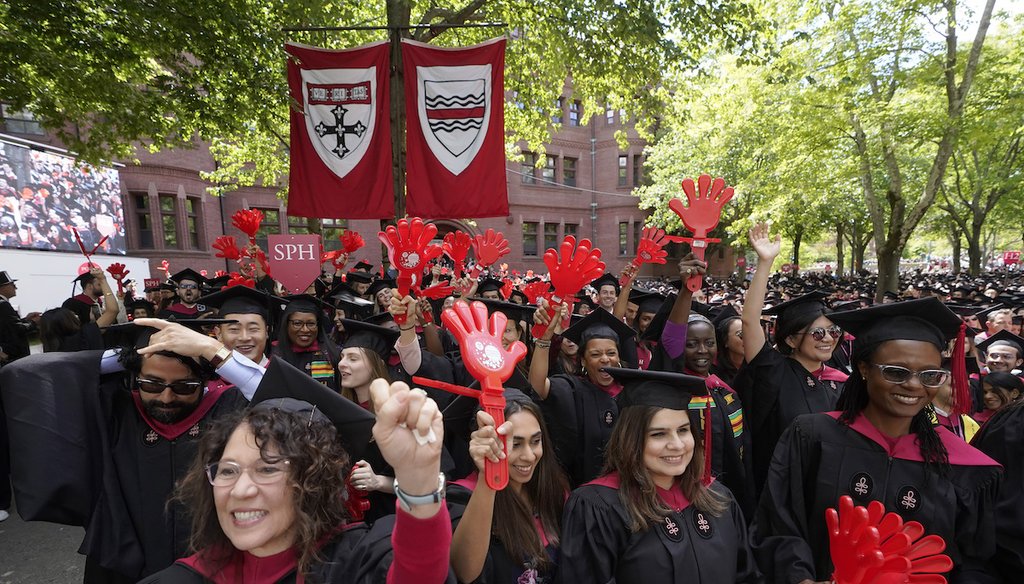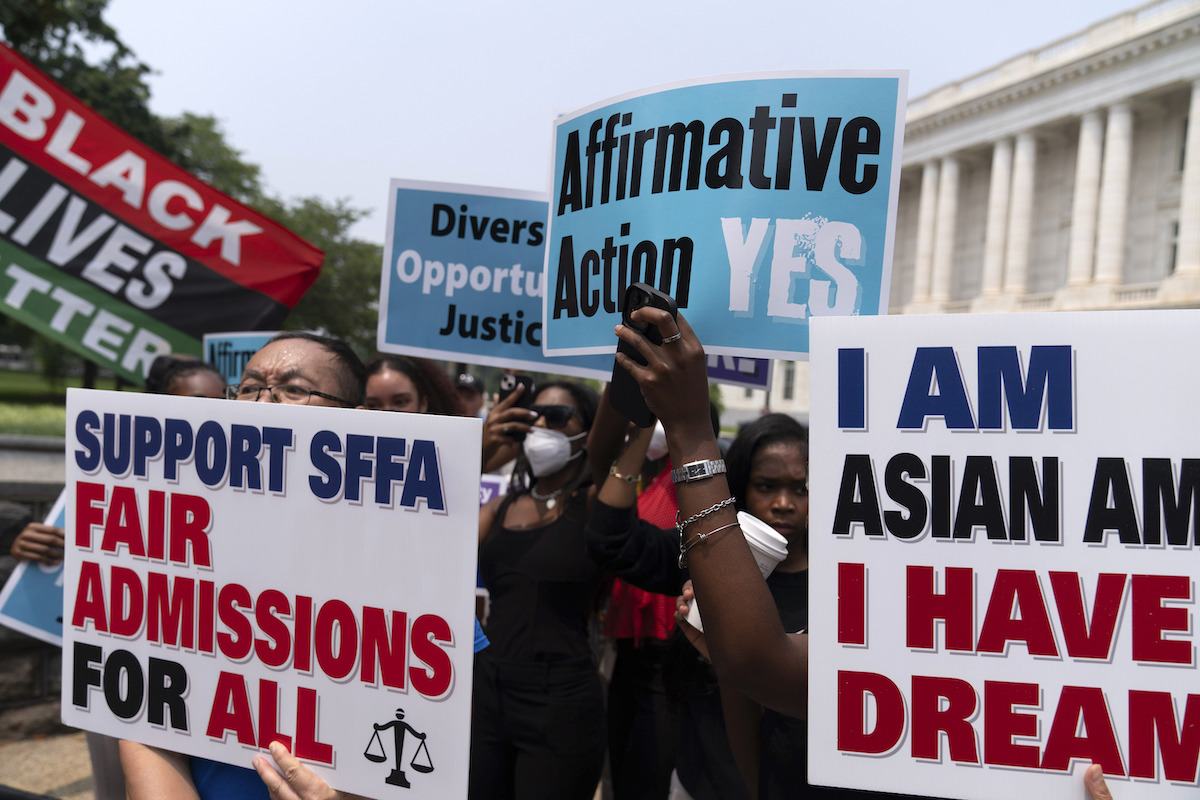Get PolitiFact in your inbox.

Harvard University students celebrate their graduate degrees in public health during May 25, 2023, commencement ceremonies in Cambridge, Mass. (AP)
A long-simmering debate over legacy admissions in elite universities and colleges heated up after the U.S. Supreme Court in a June 29 ruling struck down affirmative action in college admissions.
Colleges can no longer consider race when determining which applicants to admit, the court ruled in lawsuits involving Harvard University and the University of North Carolina.
Following that decision, politicians, the leader of the group behind the affirmative action lawsuits and even Supreme Court justices criticized legacy admissions.
Rep. Alexandria Ocasio-Cortez, D-N.Y., tweeted June 29 that legacy admissions are "affirmative action for the privileged." Rep. Barbara Lee, D-Calif., echoed that criticism, tweeting on the same day that "affirmative action still exists for white people."
In a lengthy statement posted on Twitter, former first lady Michelle Obama wrote that money, power and privilege — including having parents who graduated from the same school — are accepted as "perfectly justifiable forms of affirmative action."
Legacy admissions and why they exist
Legacy admissions policies give admissions preference to applicants who have familial connections to alumni or other people affiliated with a college. Schools define "legacy" in differing ways — some say it’s the children of alumni, others include grandchildren or other relatives of alumni.
Legacy admissions to elite universities have been a practice since the 1920s and still exist for a variety of reasons.
"Institutions have expressed an interest in developing a long-term ‘community,’ which can often, but not always, be linked to fundraising and other support goals," said David Hawkins, chief education and policy officer at the National Association for College Admission Counseling, an industry trade group.
A Harvard committee established to examine whether the school could diversify its student population without considering applicants’ race defended legacy admissions in a 2018 report. The committee said the practice keeps bonds between the university and alumni, and that alumni donations help fund financial aid plans that diversify the student body.
How prevalent and influential are legacy admissions?
Extensive data on legacy admissions is not available because many schools don’t publicly release the information.
A 2019 report from the National Association for College Admission Counseling showed that about half of four-year colleges consider applicants’ ties to alumni during admissions. The report said private colleges gave more consideration than public schools, smaller colleges more so than larger ones and highly selective schools more so than less-selective ones.
The Associated Press in 2022 requested data from 30 of the most selective U.S. colleges, but only eight responded. At those schools, the AP reported, legacy students averaged about 12% of that year’s freshman class. Some schools were notably higher: University of Notre Dame reported an average of 23% legacy students in its student body over the past decade. Legacy students outnumbered Black students in four of the eight schools.
A 2022 report by Inside Higher Ed, an online outlet for news on U.S. colleges, said 20% of admissions leaders from private schools said their institutions consider legacy status in admissions decisions, compared with 3% of leaders at public institutions.
Experts said legacy admissions, or admissions preferences of any kind, come into play mostly at selective schools, where fewer students are admitted overall.
"Among elite private schools, it is safe to assume that all of them implement legacy preferences," said Tyler Ransom, a University of Oklahoma economics professor who has co-authored studies based on data released in the Harvard case. "I suspect that most public universities observe the practice as well, though many public universities are not selective enough for it to matter."
Alvin Tillery, a political science professor and director of Northwestern University’s Center for the Study of Diversity and Democracy, agreed with Ransom’s assessment.
"It only really matters, just like affirmative action does, at those top 200 schools that are admitting less than 25% of their applicants," Tillery said.
Opponents’ argument that legacy admissions mostly benefit white, wealthy applicants is backed by evidence.
Ransom and his co-authors found that in 2019, 70% of Harvard legacy applicants were white, and that "a white typical applicant with a 10% chance of admission would see a five-fold increase in admissions likelihood if they were a legacy."
The report looked at applicants who were recruited athletes, legacies, those on the dean’s interest list (defined as relatives of donors or potential donors), and children of faculty and staff, and among that group, 43% were white. About three-quarters of those applicants would have been rejected without their legacy status, the report’s authors wrote.
Can legacy admissions be compared with affirmative action?
Experts differ on this point. Ransom thinks it is fair to compare legacy admissions with affirmative action.
"In both cases, some group of applicants is receiving an admissions benefit due to something that is outside of their individual control," he said.
But Tillery said the logic underpinning the two practices differs sharply.
"Affirmative action for people of color was put in place in the 1960s because America was a racial caste system that we were trying to shed," he said. "The question of whether legacy benefit has any kind of societal good attached to it is an open one and always has been."
Tillery said legacy admissions mostly benefit white students, but that doesn’t necessarily mean someone else is being disadvantaged. He said 75% of the students Harvard rejects are qualified to be admitted.
"So it’s really about being picked or not being picked," he said. "But if you got rid of legacy, Harvard would probably would be less white."
Richard Kahlenberg, a longtime opponent of race-based affirmative action who testified on behalf of the plaintiff in the Supreme Court affirmative action case, said the comparison makes sense.
"Both preferences are deeply unpopular, but legacy preferences are worse because they constitute affirmative action for the rich," said Kahlenberg, who is a nonresident scholar at Georgetown University's McCourt School of Public Policy.
Hawkins said ending legacy admissions would send a strong signal to underrepresented groups that colleges are serious about equity and diversity, helping to ensure those applicants will continue to apply.
He said such a move "should accompany a more comprehensive, systemic approach to eradicating systemic barriers and systemic racism in the college admission process."
Demonstrators protest June 29, 2023, outside of the Supreme Court in Washington, D.C., after the Supreme Court struck down affirmative action in college admissions. (AP)
Bipartisan opposition to legacy admissions
Democrats and Republicans have both shown support for ending legacy admissions, which also has wide public support. A 2022 Pew Research poll found that about 75% of Americans surveyed said neither race nor alumni relations should be a factor in college admissions.
Edward Blum, the head of Students for Fair Admissions — the conservative group behind the affirmative action lawsuit that went before the Supreme Court — took aim at legacy admissions in a June 29 press conference after the court’s ruling.
He said elite universities have for decades given preferences to children of alumni, faculty and staff, athletes and large donors. "The elimination of these preferences is long overdue," he said, arguing that they diminish student diversity.
President Joe Biden, in remarks after the court ruling, said the Department of Education would examine practices, including legacy admissions, "that expand privilege instead of opportunity."
Democrats Jamaal Bowman, D-N.Y., and Jeff Merkley, D-Ore., said they will reintroduce their proposed Fair College Admissions for Students Act to stop schools from giving preferential treatment to legacy students.
It’s unclear how much Congressional bipartisan support there is for taking action. But Sen. Tim Scott, R.-S.C., who applauded the affirmative action ruling in a June 29 Fox News interview, also said Harvard should consider eliminating legacy admissions.
Even the Supreme Court, which split along ideological lines in the affirmative action ruling, showed bipartisan criticism of legacy admissions.
Justice Neal Gorsuch, a conservative, wrote in his concurring opinion that Harvard’s "preferences for the children of donors, alumni, and faculty are no help to applicants who cannot boast of their parents’ good fortune or trips to the alumni tent all their lives. While race-neutral on their face, too, these preferences undoubtedly benefit white and wealthy applicants the most."
Other actions on legacy admissions
In 2021, Colorado passed a law banning legacy admissions, but only in the state’s public schools. Efforts in other states to ban legacy admissions in all schools have so far not passed amid opposition from private schools, The New York Times reported.
In Massachusetts, legislators in April filed a bill that would require schools that favor students of alumni or donors to pay a "public service fee" based on a percentage of their endowment. Harvard, which has a $50 billion endowment, would pay about $100 million a year, the bill’s sponsors told Bloomberg News. The bill is in the chamber’s rules committee.
California hasn’t banned legacy admissions, but passed a law in 2019 requiring schools with students that received state funding to report how many legacy students were admitted.
Lawyers for Civil Rights, a Boston nonprofit, filed a civil rights complaint July 3 with the U.S. Department of Education's Office for Civil Rights against Harvard’s use of legacy admissions.
The NAACP also issued a July 3 statement calling on 1,600 public and private schools with selective admissions processes to join its "Diversity No Matter What" pledge, which advocates for ending legacy admissions.
Experts say to expect similar efforts by advocates, or possible legislation or lawsuits.
"I believe we will see a more concerted effort to litigate or utilize other public policy measures to combat practices that result in de facto discrimination or to redesign systems that consistently produce inequitable outcomes," said Hawkins.
Tillery said the Supreme Court ruling has created a litigious environment that will move the U.S. toward "identity neutral admissions" at elite schools. Standardized tests, which he said are more predictive of wealth and income than students’ potential, and legacy admissions may fade away, he said.
Some private schools, such as Amherst College in Massachusetts and Johns Hopkins University in Maryland have in recent years voluntarily ended legacy admissions. Others, such as the Massachusetts Institute of Technology, have never used the practice.
More schools may decide on their own to end the practice in the interest of equity, several experts said.
Kahlenberg said he tried to get civil rights groups to work to end legacy preferences in the past, but they didn’t want to attack schools that used race-based admissions. After the court ruling, he said, "legacy preferences will likely fall at many universities."
PolitiFact researcher Caryn Baird contributed to this report.
Our Sources
Alvin Tillery, political science professor and director of Northwestern University’s Center for the Study of Diversity and Democracy, phone interview, July 6, 2023
David Hawkins, chief education and policy officer at the National Association for College Admission Counseling, email interview, July 5, 2023
Richard Kahlenberg, nonresident scholar at Georgetown University's McCourt School of Public Policy, email interview, July 7, 2023
Tyler Ransom, economics professor at the University of Oklahoma, email interview, July 5, 2023
Peter Arcidiacono, Josh Kinsler, Tyler Ransom, "Divergent: The time path of legacy and athlete admissions at Harvard," accessed July 6, 2023
Peter Arcidiacono, Josh Kinsler, Tyler Ransom, "Legacy and athlete preferences at Harvard," Dec. 23, 2020
U.S. Rep. Alexandria Ocasio-Cortez, tweet, June 29, 2023
U.S. Rep. Barbara Lee, tweet, June 29, 2023
Michelle Obama, tweet, June 29, 2023
Harvard University, "Report of the committee to study race-neutral alternatives," April 2018
The Associated Press, "Divided Supreme Court outlaws affirmative action in college admissions, says race can’t be used," June 29, 2023
The Associated Press, "Activists spurred by affirmative action ruling challenge legacy admissions at Harvard," July 3, 2023
The Associated Press, "Affirmative action for white people? Legacy college admissions come under renewed scrutiny," June 30, 2023
The Associated Press, "From campus to Congress, colleges urged to end legacy boost," Feb. 13, 2022
C-SPAN, "Students for Fair Admissions on Supreme Court Affirmative Action Decision," June 29, 2023
Colorado Legislature, "House bill 21-1173," accessed July 5, 2023
California Legislature, "AB-697 Postsecondary education: reports: preferential treatment: students related to donors or alumni," accessed July 5, 2023
Massachusetts Legislature, "Bill SD.2670," accessed July 5, 2023
San Francisco Chronicle, "Legacy admissions: Here are the numbers for Stanford and other private California colleges," July 6, 2023
Inside Higher Ed, "A Little More Information on Legacy Applicants," July 5, 2020
White House transcript, "Remarks by President Biden on the Supreme Court’s Decision on Affirmative Action," June 29, 2023
U.S. Sen. Jeff Merkley, "Merkley: Supreme Court affirmative action decision is step backwards," June 29, 2023
U.S. Sen. Jeff Merkley, "Merkley, Bowman introduce bill to end legacy admission preferences at colleges and universities," Feb. 2, 2022
MIT admissions, "Does MIT consider legacy?," accessed July 5, 2023
Lawyers for Civil Rights, "Federal civil rights complaint challenges Harvard’s legacy admissions," accessed July 5, 2023
NAACP, "NAACP Launches ‘Diversity no matter what’ pledge for colleges and universities," July 3, 2023
Lawyers for Civil Rights, "Complaints under Title VI of the federal Civil Rights Act of 1964," accessed July 5, 2023
The New York Times, "Harvard’s admissions is challenged for favoring children of alumni," July 3, 2023
The New York Times, "Elite colleges’ quiet fight to favor alumni children," Oct. 31, 2022
Fox News, "Tim Scott: America should ‘celebrate’ SCOTUS affirmative action decision," June 29, 2023
Supreme Court ruling in Harvard University, North Carolina University vs. Students for Fair Admissions, June 29, 2023
Supreme Court, Sonia Sotomayor dissent, June 29, 2023
Bloomberg, "Harvard legacy admissions targeted by Massachusetts lawmakers," July 5, 2023
National Association for College Admission Counseling, "2019 State of College Admissions," accessed July 5, 2023
Johns Hopkins University, "JHU ends legacy preference in admissions," Spring, 2020
Amherst College, "Amherst College to end legacy preference and expand financial aid investment to $71 million," Oct. 20, 2021
Pew Research Center, "As courts weigh affirmative action, grades and test scores seen as top factors in college admissions," April 26, 2022
Politico, "Affirmative action is done. Here’s what else might change for school admissions.," June 29, 2023
Stanford University, "Annual report in compliance with Education Code 66018.5 regarding undergraduate admissions for Fall 2022 enrollment," accessed July 5, 2023
Stanford University, "Annual report in compliance with Education Code 66018.5 regarding undergraduate admissions for Fall 2019 enrollment," accessed July 5, 2023
JSTOR, "The Origins of legacy admissions: A sociological explanation," March 2011
Spark Admissions, "Which colleges consider legacy status?," accessed July 6, 2023
Yale Daily News, "Quinlan testifies in support of legacy admissions," Feb. 18, 2022
The Harvard Crimson, "Supreme Court, President Biden take aim at legacy admissions," June 30, 2023
James Murphy, Ed Reform Now, "The future of fair admissions: Issue brief 2, legacy preferences," Fall 2022
Inside Higher Ed, "What admissions directors think of affirmative action, SATs, legacies and more," accessed July 6, 2023
Vox, "Affirmative action for white college applicants is still here," July 6, 2023




























